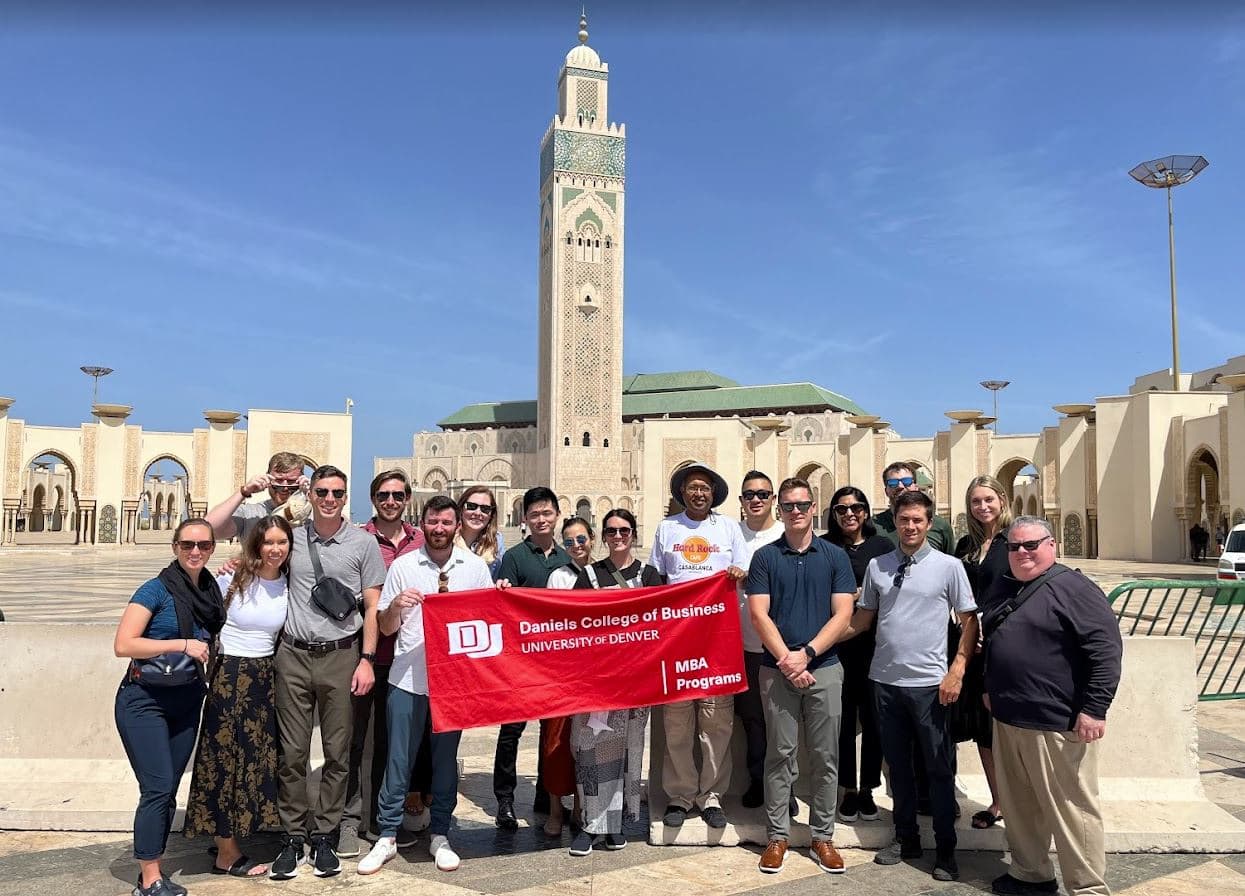Navigating global business with international experience
When you think of international experience, you may be thinking of ways to try new foods or fill the grid on your Instagram profile. However, international travel can also help you advance your career, if you approach globetrotting with the right mindset.
Traveling abroad is not just a stamp in your passport—it may teach you new skills to add to your resume or even provide a story to tell in future interviews. And even if you don’t plan on working abroad, all students should know how to operate in the global economy, according to Daniels College of Business professor Doug Allen.
“In the 21st century, even students that don’t plan on international business as a career will be impacted by international business,” Allen said. “At the end of the day, even the most local of businesses is impacted by global supply chains and possibly global customers.”
Allen is a travel expert; he received his undergraduate degree from the University of Zimbabwe and has led numerous international trips at Daniels. His primary takeaway from years of global experiences? Travelers receive a widened worldview that can be applied across disciplines.
“Overall, [travel abroad] becomes a powerful source of perspective,” he said.
Transferable Skills Developed through International Experience
International travel brings a variety of transferable skills that can translate to your job hunt. Those include:
- Inclusive excellence: Active, intentional and ongoing engagement with diversity
- Commitment to valuing difference: Seeking out and appreciating differences
- Confidence: The ability to successfully navigate a new or different environment
- Knowledge of other cultures: Gaining cultural knowledge to better communicate with people of diverse backgrounds
- Flexibility (dealing with ambiguity): Adapting to new situations or environments
- Worldliness: Having a sophisticated knowledge of other cultures, diverse people and places
- Tolerance: An open-minded acceptance of people and other cultures
- Resourcefulness: Being able to creatively succeed by taking advantage of available resources
- Empathy: The ability to see situations from others’ perspective
Practical Job Hunting Tips for Framing Your International Experience
“Travel abroad is one of those interview-worthy experiences,” Allen said, highlighting how international experience can differentiate you as you search for a job.
In a recent conversation with a corporate recruiter, Allen said they prioritized candidates that could speak about cross-cultural experiences in an interview setting.
“They said, of course, the finance, accounting or marketing degree is important preparation. But that’s the kind of the entry ticket that gets you on the list. What will differentiate you from the many people who have marketing or accounting degrees will be your ability to work across cultures,” he said.
Allen encourages students to include experiences abroad in their interview responses or reference global projects and experiences on their resume. For example, if you went to Singapore for a consulting project with an international client, include that on your resume. However you make cross-cultural business skills a part of your job application, be sure you’re able to articulate why the experience was important to you as a business professional.
Resume Tip: Remember to translate cross-cultural experiences to skills you’ll need in your new role
“Companies increasingly are looking for people who have a global mindset. You have to be able to communicate to your employer that you do have a global mindset. Specifically, a modifiable global mindset,” Allen said. This means that you have an open view of the world and are willing to change your own viewpoint depending on the circumstances.
4 Opportunities For International Experience at Daniels
Interterm Travel Courses: Exploring International Business During Academic Breaks
During interterm—the period between academic quarters—students can participate in travel electives that cover a variety of topics. For instance, students can practice stress management techniques in the mountains of Montana; learn about culture and politics in Japan; or explore the physical and cultural landscapes of South Africa.
At Daniels, there are four interterm periods throughout the year, and travel courses are offered during each of them, so there are plenty of opportunities for students to get out there and explore.
Electives With a Travel Component: Integrating Global Learning Into the Academic Year
Travel courses aren’t just offered during interterm. Students have the opportunity to take classes with a travel component throughout the academic year. At Daniels, these courses explore topics such as global business, micro-finance, entrepreneurship and impact investing. Students should work with their academic advisors to find a course that fits their goals and schedule. Learn more at daniels.du.edu/about/global.
International Internships
Pursuing an international internship is not the most common way to learn and travel abroad during school, but for some students, it’s a highly immersive option. For those interested in securing an internship in another country, there’s a lot to consider. Daniels Career Services offers tools, resources and engagement opportunities that may help.
Program-Specific Travel Opportunities
Certain graduate programs include a travel component as part of the curriculum. For instance, all of Daniels’ MBA programs incorporate a travel experience. To find out more, visit the “Global” section of the Daniels website.
Embracing Global Learning in Today’s Business Environment
Whether your customers are located in Denver or Denmark, it’s important to understand the tenets of global business. If you’re able, global travel is a great way to immerse yourself in different cultures, step outside of your comfort zone, and grow. With years of travel to lean on, Allen has sage advice for business travelers.
“Travel builds your confidence and humility at the same time. And all of that can be reflected in the resume as you talk about the power of [international] experience,” he said.
So, if you travel during your academic career, do so with your career in mind. Even if you don’t want to work in Paris following your internship, there are some important lessons to apply wherever you land.



